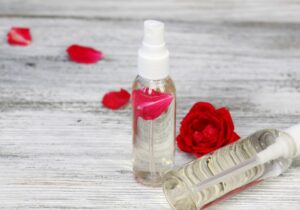Table of Contents
The Ultimate Guide to Rose Water: Benefits, Uses, and DIY Tips
What Is Rose Water?
Rose water, derived from rose petals through steam distillation or steeping, is a versatile liquid rich in antioxidants, vitamins, and natural compounds. While it’s often overshadowed by rose essential oil, rose water offers unique benefits that have been cherished for centuries.

The Ultimate Guide to Rose Water: Benefits, Uses, and DIY Tips
The Historical Significance of Rose Water
From Cleopatra’s beauty rituals to ancient Babylonia’s medical practices, rose water has been a staple in beauty, health, and even cuisine. Its soothing and fragrant properties made it invaluable in royal courts across Persia, India, and the Middle East.
Key Components of Rose Water
Unlike synthetic skincare products, rose water contains natural compounds such as geraniol, eugenol, and citral, which contribute to its antimicrobial, anti-inflammatory, and antioxidant properties. These make it a powerhouse for combating skin aging, acne, and redness.
Top Benefits of Rose Water
1. Antioxidant Effects and Free Radical Protection
Rose water helps combat free radicals, the culprits behind premature skin aging. Its antioxidant-rich composition supports skin regeneration and protects against environmental damage. According to research on antioxidants, natural compounds in rose water may even have anti-cancer properties.
2. Soothing Inflammation and Healing Acne
For those battling acne, dermatitis, or rosacea, rose water offers gentle relief. Its antibacterial and anti-inflammatory properties can reduce redness, heal scars, and balance oily skin. Simply use it as a toner or facial mist for daily hydration.
3. Oral and Eye Health
Rose water isn’t just for skin—it can also be used in mouthwashes and eye drops. Its antimicrobial properties make it effective against mouth ulcers and eye infections like conjunctivitis.
4. Hair Care and Scalp Health
While not heavily studied, anecdotal evidence suggests rose water can reduce dandruff and improve hair texture. Adding it to your shampoo or using it as a scalp mist may promote healthier hair growth.
5. Aromatherapy and Culinary Delights
Rose water’s calming scent can uplift moods and reduce stress. Additionally, it’s a common ingredient in Middle Eastern and Indian cuisines, used in desserts, teas, and savory dishes to enhance flavor and aroma.
DIY Rose Water Recipe
Ingredients
- 1 cup fresh, unsprayed rose petals
- 2 cups distilled water
Instructions
- Wash the rose petals thoroughly to remove dirt or pesticides.
- Place the petals in a heat-safe bowl and cover with boiling water.
- Let the mixture steep for 30 minutes.
- Strain the liquid and transfer it to a clean glass bottle.
- Store in the refrigerator for up to one week.
Choosing the Best Rose Water
Not all rose waters are created equal. Look for:
- Organic certifications
- Steam-distilled products
- Minimal additives or preservatives
- Transparent appearance and a faint rose scent
For premium quality, consider products from Bulgaria’s Valley of Roses, a region renowned for its rose oil and water production.
How to Use Rose Water
For Skincare
Use rose water as a toner, mist, or face mask ingredient. For acne, mix it with witch hazel or aloe vera for extra soothing effects.
For Haircare
Spray it on your scalp to reduce inflammation or mix it into your shampoo for added shine.
For Health
Add rose water to teas or desserts for its calming aroma and mild taste. Its antibacterial properties may also aid in oral hygiene.